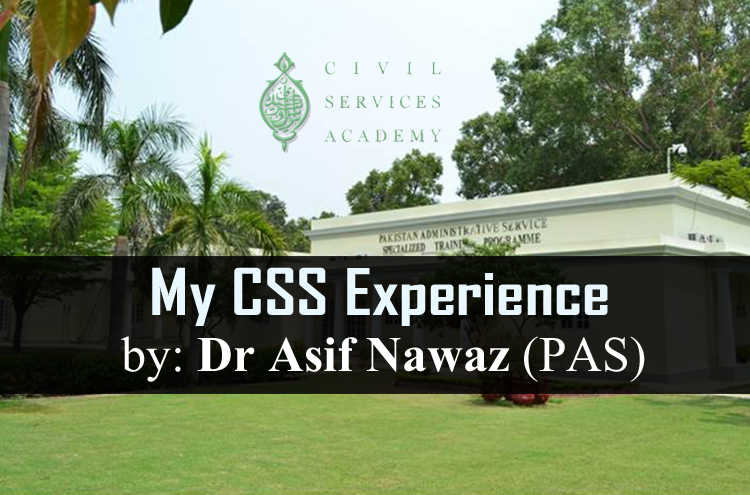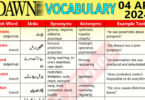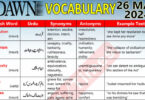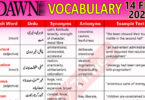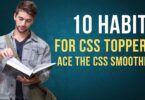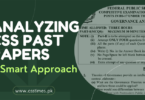- Disclaimer: If you expect this post to be something like a pep-talk telling you very sternly that “you need to prepare for 10 hours daily for 10 months to ace CSS exams”, you’ll be disappointed. I don’t function that way, have never been that consistent, and cannot sound all scholarly and noble just for the sake of it. If you want me to tell you exactly how to excel in the exams – given that I topped my province and scored 6th position overall in Pakistan – let me assure you it was never my plan. It’s more of Almighty’s doing than my own, so cannot flutter about that. Also, if you’re not a fan of reading long posts, well, you might like to use that cross button on the top-right corner of your screen right now!
If you’re still with me, I need to make a point that it’s very important to realise that whatever I say here is solely, only my personal experience and thoughts. This is not a standard guide on the CSS examinations – I am neither a teacher nor an examiner. I’m only doing this for all the people who specifically have asked me to share my thoughts on it. My preparation was all over the place, it didn’t follow well-defined sources, or specific books or a proper routine. I did what I felt was working for me, you should do the same. Even the many recommendations I make in my post here aren’t infallible or necessary – they are only things I retrospectively think can benefit you. Some of you might disagree with things I list here, some might have better ideas, and some may find my way quite impractical and impulsive. Also, what more learned, experienced people might have told you could be in contrast to what I say here, so take all my ramblings with a pinch (or pitcher) of salt. Do your own thing, make your own moves and grooves – and shine for who you really are!
Time for preparation:
So this is the million dollar question I have been consistently asked since the results came out: how much time do you need to prepare for CSS exams? Let me be very clear here. Unless it’s one of those unisex, free-size ones designed by Crocs; one shoe never fits all. It’s all very personal, depending on your background knowledge, general ability, interest and attention span. Some people prepare for years while some for months. Personally speaking, I took about 3-4 months to prepare for the written part of the exams. I had just got done with my house job, and even those months came with a lot of hitches: I wasn’t actually determined at first, had some personal issues on the side, weighed down by some passing professional commitments, and used to travel every week or at least every second one between Lahore and my city Abbottabad (that’s about seven hours drive one way, for those weak in geography) for the most part of those four months. I signed up for weekend classes at World Times Institute, Lahore – but couldn’t properly follow up on those because of the reasons listed above – though it was quite beneficial in a lot of ways. Also attended various seminars on CSS at will. Yes, you can prepare (for the written part at least) without an academy. If you need an academy to tune you up, enrolling for regular classes would be the right way to do it. The point here being: my preparation was in patches and starts. There would be times when I would just finish a whole optionals’ book in two days, and others where I would do nothing except for roaming around Lahore with my cousins and catching up some lewd Punjabi stage show at night. But besides the actual preparation time, I feel that the CSS exams is about a lot more – your background standing to be exact.
Background:
And since we’re on it, I should tell you that despite my actual preparation time being quite less, there were a lot of other factors at play as well. Though I am a doctor, I was always inclined towards politics and current affairs and had ample knowledge of the subjects even before I had made up my mind to go for these exams. (There were a very few eye-opening OMG moments in the prep – and most of these were in the optional subjects – I had a slight idea about many things already). My parents are from the Army, and quite knowledgeable about a lot of things – so that definitely helped. My education, the numerous teachers I have had the honour of being a student of would definitely be a factor. I have a lot, a lot of wonderful, intelligent friends that come from varied backgrounds, and those have been learning experiences as well. Besides, writing never really was an issue for me. I have been writing for quite some time now, and my articles have appeared in various newspapers and magazines of the country – catering to subjects ranging from politics, social commentary, humour and travel pieces. I have made short films, and also have had a flimsy relationship with photography – opening my mind while attempting these. I have also travelled quite much through my country, and many of the things I wrote in the papers came from experiences that came long before and weren’t quite intended for these exams. Being open to numerous experiences and adventures definitely contributed towards the state of mind I was in while preparing for these exams. I’ve always liked reading about things I don’t know about, and though I’m not an avid book-reader by international standards, here in Pakistan we read so little that I guess I’d still pass as one (my dream for Pakistan is people ogling less at others and more at their books). So the point I’m making here is not my self-publicity, but only that I would have required a lot more time and nerve to prepare had I not already been in this position. So the best advice I can give you regarding the time duration is to judge yourself beforehand, and work out your path accordingly. This is a very subjective exam. This is not a Crocs shoe.
Some General Tips for CSS Preparation:
– English forms a major chunk of what you’re going to do in the CSS examinations – not just for the English papers but pretty much for all of them. This is not to say that you need to use some heavy words and expression that would put Shakespeare to shame. But if you struggle with tenses and grammar, that may count as a cardinal sin in the exams. So work on those before actually attacking the examination process. With those things right in place, you can only get better.
– Reading is important. You know how they say that no one became a good writer without being a good reader? Read whatever you want to. While good, authentic reads may help you a lot towards the CSS journey, don’t think about diving straight into Henry Kissinger if you haven’t read anything before. Start with tabloids, sports magazines, show business ones (even Twilight would do if that’s your sort of thing) – anything at all that piques your interest in reading without scaring you away. You’ll learn new words, sentence structures and expressions.
– In the CSS examinations, the actual time spent while attempting the papers is equally, if not more, important than the time you’ve already invested in preparing. In my MBBS examinations, attempting would be a piece of cake. If I knew the answer to a question, I’d just hurriedly write down the diagnosis, investigations and stuff without having to worry about any strings attached. In CSS though, you properly have to design an answer. You need to make it readable, intelligent and attractive. In all the papers, I would first make a rough outline of the answer that I was thinking of attempting, and only show myself the green signal if the first draft looked good.
– Accordingly, garnish your answers with all sorts of confetti you can bring to the paper. I inserted a lot of headings in every question. Put in as many quotes, statistics and references as you can remember. Make diagrams wherever you can. People often let out a gasp whenever I tell them this, but come on – we have been seeing the Pakistani map on the back of every textbook of ours since we were in school. How difficult is it to just reproduce that? To go further, how difficult is it then to roughly draw the three corridors of CPEC on the same map that we know too well. CPEC is here to stay, if you cannot make its draft on the paper – you have no one to blame but yourself.
– I might sound like your English teacher that you hated in school, but take care of your handwriting. It’s important, and especially so since attempting the papers is a lengthy, exhausting process – and the writing tends to lose its youth (nothing’s eternal, alas!) as you cross the half age of the paper. Interesting, the first thing the Chairman FPSC commented on during my panel interview later on was my handwriting. So no random lecturing you here!
– There’s no end to CSS preparation, let’s get this straight. I know people who study for two years and still develop cold feet before the exams since they’ve not covered everything. What’s everything? You can be a cat and have all your nine lives dedicated to preparing for CSS and still might not make it to this abstract, weird concept called everything. The Pakistan-India relations, for example, is just one topic in the exams. But uncountable books have been written on only this, how do you imagine you can ever cover everything? The preparation is subjective. A good idea would be to have the syllabus before you, and gain confidence for yourself if you know enough about a topic, can write on it effectively, can form an intellectual opinion on it and know various dimensions of the issue to analyse it critically and wholesomely. If you succeed in this, you probably are prepared enough.
Compulsory Subjects:
Without further ado, let’s get straight to the point.
Precis and Composition:
I couldn’t prepare for this one at all. Had planned to, but ran out of time. Tried to do some past papers on the day before the exam, but found those to be generally tough and the exercise futile – so gave up. However, this paper has a lot of questions, and unlike the Essay one – you can score in one question if you haven’t really done well in another. Also, the MCQs portion of this paper is generally quite something. Don’t lose heart if you don’t know those fancy synonyms and antonyms. I, for one, didn’t. Tip: do try to get your hands on any book available in the market, and at least go through all the questions – the pair of words, prepositions, translations and basic precis writing at least. Also, you definitely need to learn the whole Merriam Webster dictionary for the MCQs portion of this paper.
Essay:
I was kidding about the dictionary part above. Now let’s address the elephant in the room. The essay paper – the scariest of them all. The bad news is that I cannot tell you exactly how to prepare for it. There are a lot of factors that go into making your essay an impressive one. Your level of written English, how well you understand the topic, how much you know about the topic, and how comprehensively and smoothly you bring to paper the various facets and issues of the given topic – while covering the word count and the time duration. The good news is that I can give you some random tips on it. It’s important to practice. Writing in English is one step further than just getting your English right. Start with choosing random topics and attempting them effectively without keeping the word count or time duration in mind. Then proceed on to attempting the paper with the exam’s terms and conditions. But writing English in subjective, what I think is crap could be hailed as a towering literary genius by someone else – so who am I to speak? The deal then, get a good English teacher (better if it’s someone with CSS experience) and get your essays checked. I repeat: get your essays checked. And work on the errors that the teachers point out. Now personally speaking, I could not prepare for the essay paper (time is savage, I tell you), I practiced only two essays for the examination process – one for the mock exams I took in WTI Lahore and the other in the actual CSS exam. That’s it! Regarding the outline, I made a rough one before attempting the essay, adding and subtracting to it while actually writing my paper – and wrote my final outline in the end in light of what I had actually written. Also, it’s vital to follow a structure in the essay – various people will tell you various structures, and nothing is the absolute truth. My structure essentially went like this: Introduction. Present Scenario. Genesis of the Issue. History. Controversies. Suggestions. Conclusion. Oh, and I thought I had done so bad in my essay that I came back home and announced I won’t be sitting any more papers – but thanks to my abba who kicked me out of the house to take the full exams and a massive stroke of luck – here I am. So don’t worry – Essay is very taxing, you can never really feel you’ve done well in it. Just concentrate on the coming papers.
Islamiyat:
Preparing for Islamiyat was a bit tricky since I was taking it in English (you can also take it in Urdu if you want, but I thought writing eleven papers in one script and one in another wouldn’t be a very good idea and you have your English expression already polished since it’s such a big part of the exam), and I couldn’t find any good book of Islamiyat in English. There are some very good books in Urdu though, and what I did in the end was preparing for this subject in Urdu and attempting it in English. Also, I gathered about 40-50 Quranic verses in Arabic along with references that would generally cover all the topics in the syllabus. In the paper, I wrote the Arabic verses, with references wherever I could remember (and honestly, that was rare), without any translation.
Current Affairs:
Jahangir World Times Magazine is one great resource for current affairs. Religiously went through the latest four issues of this magazine. The preparation for current affairs is very general. If, however, you lack in the background knowledge of what’s happening in the world, start with getting your hands on any book designed for CSS preparation available in the market (discovered NOA academy’s book on the subject later on during my interview – and it was a great book), and follow it up in the news. For example, there’s little point of keeping yourself updated with the Irish border issue in Brexit if you don’t know the actual story behind the European Union and what Brexit actually is. And by the time you’re all charged for the actual exams, you’d already know the burning issues that might be asked about in the paper. Just try to get in as much as possible: if you’re on Facebook, the memes can wait and try to follow some good sources. And please don’t, don’t, don’t believe every shared post you see on Facebook. If you’re on Twitter, follow some good journalists – national and international, along with some news agencies’ handles. And since you already spend a big part of your day with your mobile phone, try browsing through the websites of CSIS, The Economist, Time, The Guardian, Al Jazeera etc as often as you can. It’s 2018, why are we still forwarding those WhatsApp videos?
Pakistan Affairs:
For the pre-Independence portion of this paper, follow any history book or read about the topics on the internet. This is the breezy part, since we have gone through all that in our Pakistan Studies’ classes in school – only that you need to add an analytical lens here. The post-Independence portion can be covered via various sources. Some topics in Pakistan Affairs do tend to overlap with Current Affairs subject. Like most of the subjects in the CSS exam, you’ll have to make your own way through this subject as well. What I would strongly recommend here owing to my personal experience is the book “Pakistan: A Hard Country” by Anatol Lieven. A great, enlightening resource. Also try to read Maleeha Lodhi’s “Beyond the Crisis State” for this one. Besides these books, the more you know, the better. Keep your eyes and ears open, and try to be confident about the topics enlisted in the syllabus. Easier said than done, I know, but well.
General Science and Ability:
Theoretically one of the easier papers to prepare for, since it’s pretty straight forward. Just get any CSS book designed for this paper available in the market, and go through it well. In almost all the other papers of CSS (if you’re not choosing a science subject in the optional subjects), you have to make up your answers in the papers. In GSA, you either know the things or don’t – so a good preparation really counts here. If you, like me, haven’t had any intimacy with maths since the 10th grade, you should spend more time on polishing that portion. Some solid marks there, don’t lose them just like that (if there at all is something you should be willing to lose – it’s belly fat, not marks). I had to skip the maths portion while preparing, but luckily found the maths questions in the exams to be on the easier side. And don’t forget the diagrams and figures while attempting this paper.
Optional subjects:
My optional subjects were International Relations, International Law, Sociology, Gender Studies and US History. These are generally easier than the compulsory subjects, the passing percentage requirements are lower (33 percent versus 40 percent), the syllabus is limited and concentrated, you can actually pick up a book or two for each subject and just get done with it. I personally started my preparation with the optional subjects, and except for IR, was done with these in one month. I can only give you some tips on these subjects owing to my personal experience.
International Law:
A very easy, limited and interesting subject. Though if you, like me, come from a different educational background and all contact you’ve had with law is getting a ticket for over-speeding, you might require some effort to actually understand the soul of this subject. Might seem awry at first, but becomes a guilty pleasure later on. Okay not really, but you get the point.
US History:
Thanks to Hollywood, you’d already have some knowledge of American history. The Civil War or Slavery or Civil Rights Movement or Women Emancipation – you’d have a slight idea of something at least. What’s important to do in this subjects is to make a story in your head as to how the American history actually progressed. Who came first? The chicken or the egg? Lincoln or Roosevelt? Once you’re done with it, the rest is the easier part. US history actually follows a very interesting trajectory with occasional set-backs. If you are something of an history buff, you’ll find this subject very rewarding.
Sociology:
The theoretical part in this subject are the sociological theories. Do them really well, understand them thoroughly. The rest of the subject is actually founded on these very theories. Which is not saying that you don’t need to do the rest of the syllabus – just that it follows from the theories and everything fits into place like this. Also, attempting the paper with good expression is very important here. There’s no maths here, only an opinion-based approach – so make sure what you write is fun to read (not in the bad sense).
Gender Studies:
Very similar to Sociology in approach. The feminism theories (no, there’s a lot more to feminism than man-hating – as this subject suggests) form the back-bone of this subject. Do them very well, and relate to them wherever you can. Again, expression is very important here. Do try to dig out sources to read about gender issues with a clear focus on Pakistan.
International Relations:
So you’d already know that this subject was butchered wildly in CSS this year, but since I came out alive – I’m not complaining. Paper one of this subject is pretty theoretical and straight forward. It’s also very interesting and eye-opening, especially if you’re interested in how countries do or should work. Paper two of this subject is essentially like Current Affairs; with a topping of IR theories, terminologies, approaches and jargon. You might do better with preparing the over-lapping topics of IR and Current Affairs by IR books. Finding one definitive source for IR might be a little difficult. A friend who’s a Masters in IR from Lahore sent me a bundle of his notes for the topics that were enlisted in the syllabus, and those were very helpful. The outlines by Sir Zahid Aziz in World Times Academy, were also a great resource. Also, there’s a book called “Prisoners of Geography” by Tim Marshall. I read it before I had decided to prepare for CSS, but it gives you some great insight on various topics in IR, International Law, Current Affairs, and possibly even Pakistan Affairs.
Psychological and Interview:
Trivia:
The last line was a joke. But I haven’t really been asked much about the interview stages. If you want to know about me, just tell me and I’ll make another post on it as I get some time. Now can you tell me how many times have I used the word “subjective” in the post above? Guessed so. Were you even paying attention?
The Last Word:
So basically, this is it. I wish you all the very best of luck – I personally feel that I’m just blessed – and luck and blessings are the most I can wish for you. If there still are individual questions that you want me to answer, just ping me on Facebook (Asif Nawaz) or Twitter (@asifnz). I’ll get back to you as soon as I can. All my warmest regards!

